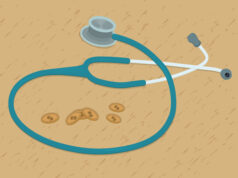It’s been just over one year since the Covid-19 public health crisis took hold in the US and the crisis has transformed how providers deliver and, as importantly, how patients access care. Healthcare organizations demonstrated amazing resilience, agility and innovation to focus attention on how best to engage diverse patient populations, according to their preferences and needs, as well as how best to deliver care.
Healthcare organizations quickly turned to the power of the cloud to expand critical care and improve care continuum, all while minimizing exposure to risk for staff and patients. Connecting with the right patients at the right time is critical and technology is vital to helping care providers respond to the evolving demands while providing access to connected care teams and real-time patient reporting.
Microsoft’s latest eBook offers a look into how technology can help organizations meet patients’ changing expectations and provide personalized care. In this interactive e-book, Personalizing Healthcare: Engaging Patients in the Digital Age, organizations can learn ways to use the Microsoft Cloud for Healthcare offering to:
- Enhance patient engagement, empower health team collaboration, improve operational and clinical data insights, and ensure interoperability
- Give patients the personalized, easy-access digital experience they’re already accustomed to from other online services.
- Enable a deeper connection with patients by keeping their data automatically updated in your EMR so you can focus on their individual care.
- Overcome communication delays to deliver care in real time using connected systems and patient-generated health data.
Microsoft Cloud for Healthcare provides capabilities to manage health data at scale and make it easier for healthcare organizations to improve the patient experience, coordinate care, and drive operational efficiency, while helping support end-to-end security, compliance, and interoperability of health data. This end-to-end, industry-specific cloud solution includes released and new healthcare capabilities that unlock the power of Microsoft 365, Azure, Dynamics 365, and Power Platform.
Northwell Health, an integrated health system that includes 23 hospitals and nearly 800 outpatient facilities, offers an example of how health systems are collaborating with Microsoft. As a way to reduce the amount of time it takes for physicians to access patient data and allow them to have more time to focus on patients, the health system enlisted Microsoft Teams to support secure messaging for 72,000 staff including clinicians, pharmacists, social workers and other staff members.
Dr. Vish Anantraman, Chief Technology Innovation Officer, worked with his staff and Microsoft to develop NORA, a chatbot extension of Microsoft Teams, to reduce the time it takes for staff to access patient information from their electronic medical record (EMR). The chatbot was built using an assortment of Azure technologies, which allowed the team to build a complex app without spending a lot of time and money. NORA speeds up the time it takes to access data such as test results and a patient’s complete blood count.
“A typical development cycle for a language bot like this might be years,” said Dr. Anantraman. ”But it ended up taking us only a few months, even without any expertise in bots or language processing, because we could use pre existing technology, both from Office 365 and the Azure platform.”
Microsoft and partners are committed to helping the healthcare industry develop the tools they need today and tomorrow to provide the best healthcare outcomes. To learn more, read Personalizing Healthcare: Engaging Patients in a Digital Age, and find out how to do more for patients by providing easy access to the information and tools that they expect.







